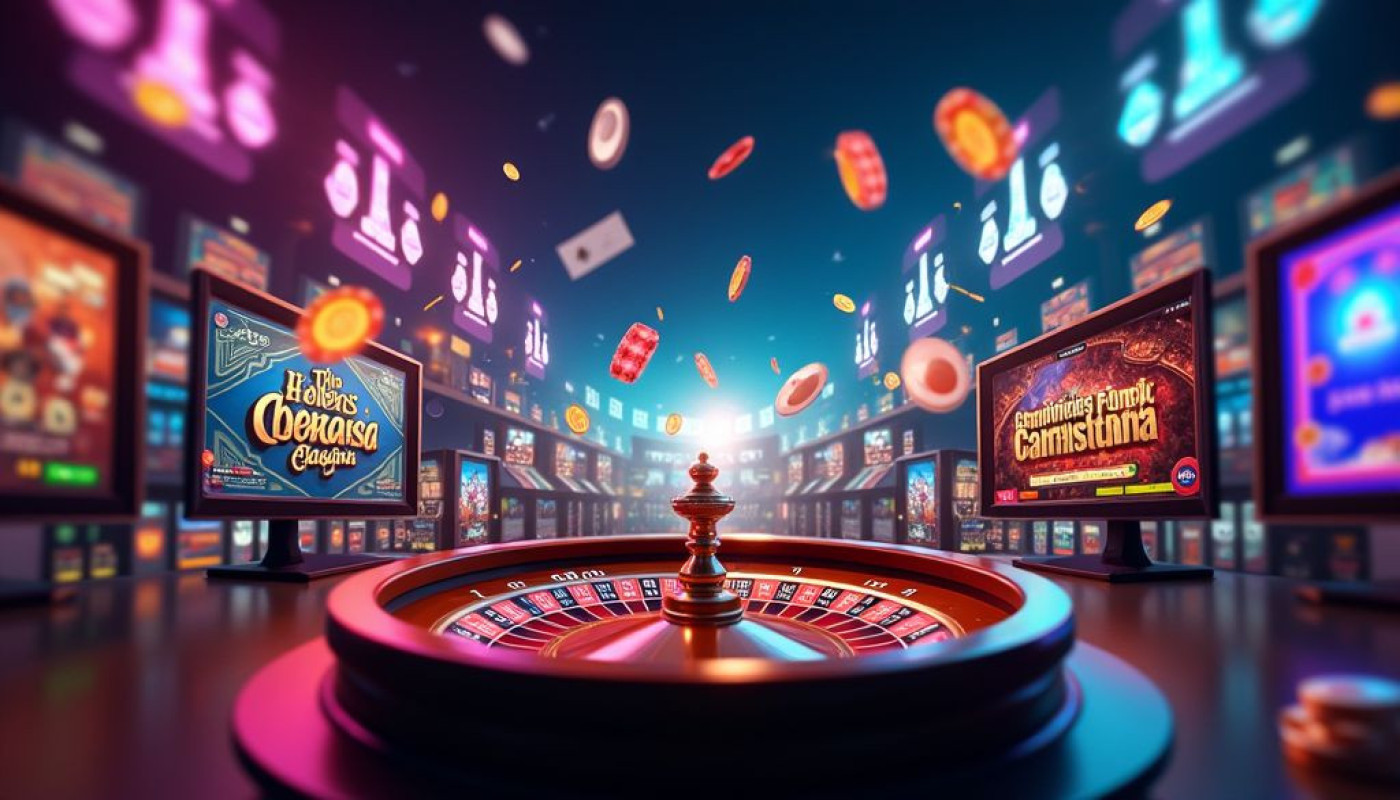Table of contents
The advent of virtual reality has revolutionized numerous industries, but one sector that stands on the precipice of a transformative leap is the casino industry. Imagine donning a headset and finding yourself transported into a world where the clinking of slot machines, the shuffling of cards, and the excitement of a winning roll at the craps table are as vivid and immersive as in a physical casino—but all from the comfort of your home. This is the promise of virtual reality casinos, a new frontier that blends cutting-edge technology with the thrill of gambling. As the lines between reality and virtual space continue to blur, enthusiasts and newcomers alike are discovering the unique experiences offered by these digital establishments. With a burgeoning market and endless possibilities, exploring this novel domain is not just a passing fancy—it's peering into the future of gaming and entertainment. Read on to delve deeper into what makes virtual reality casinos an exhilarating venture for players and the industry alike, and why this innovation is more than just a fad, but a glimpse into the future of interactive entertainment.
Immerse Yourself in the Virtual Casino Experience
Virtual reality casinos are redefining interactive entertainment by creating an immersive experience that rivals the buzz and glamour of a brick-and-mortar casino. Through the advanced technology of virtual reality gaming, users are transported into a digital casino that stimulates the senses in a multi-dimensional space. The sensory engagement is heightened as players can hear the clinking of chips, feel the texture of the cards, and see the detailed casino environment that surrounds them.
Interaction is a pivotal element of this new frontier, enabling players to engage with the digital environment and other enthusiasts in real-time. Users can gesture naturally, pick up objects, and communicate with others, making the experience feel authentic and social. Adding to the realism is "haptic feedback," a feature that provides tactile sensations, giving players the sense of touch as they handle chips and cards, further blurring the line between the virtual and real world. The culmination of these elements makes virtual reality casinos an epitome of interactive entertainment, offering a compelling alternative to traditional gambling venues.
The Technology Behind the Magic
Virtual reality casinos are the result of a confluence of rapid technological advancements in VR hardware and gaming software. The immersive experience of these establishments is powered by advanced virtual reality tech, which has evolved tremendously over the years. The crux of this experience lies in sophisticated VR headsets, which provide users with high-resolution displays and motion tracking capabilities. This hardware works in unison with cutting-edge gaming software, designed to create responsive and detailed casino environments. As virtual reality technology has matured, its capacity for real-time interaction has become paramount to its success in replicating the nuances of a physical casino. A key technical aspect of these virtual environments is minimizing latency, the delay between a user's action and the system's response, which is fundamental for an immersive and seamless gaming experience. By prioritizing low latency, VR casinos ensure that every shuffle of cards, spin of the roulette wheel, and interaction feels as immediate and real as it would in a brick-and-mortar establishment.
The Social Aspect of Virtual Reality Casinos
Amidst the high-tech allure of virtual reality casinos lies a compelling layer of social gaming that goes well beyond solitary play. These immersive platforms are becoming hotspots for virtual communities, where players interact not merely with the game but with each other, fostering a vibrant social environment akin to a traditional casino. Within these digital realms, multiplayer experiences are elevated as individuals don avatars, their digital personas, to communicate, bluff, and celebrate together. Online interaction in this context is not just a feature but the backbone of the virtual casino experience, offering a sense of camaraderie and competition that mirrors the hustle and bustle of physical gaming floors. Player communication is facilitated through various in-game tools, allowing for real-time conversations, which can lead to the formation of friendships and rivalries alike. As such, virtual reality casinos bridge the gap between the excitement of a live casino experience and the convenience of online play, making them a burgeoning hub for social interaction in gaming.
Security and Fairness in a Digital World
In the realm of virtual reality casinos, digital security and gaming fairness are pivotal in crafting a trustworthy and enjoyable experience for users. To achieve this, VR casinos implement advanced encryption protocols, ensuring that personal and financial data are protected from unauthorized access and cyber threats. These security measures are akin to the robust digital fortresses that safeguard traditional online banking systems, thus creating a secure environment where users can confidently engage in gaming activities.
To ensure fairness, VR casinos rely on provably fair random number generators (RNGs), which are the backbone of unbiased gameplay. These systems are rigorously tested and certified by independent auditing firms to guarantee that every card dealt, dice roll, or slot spin is random and free from manipulation. The trust-building process between service providers and users is further reinforced by transparent practices and clear communication regarding the fairness protocols in place.
In the vanguard of trust and transparency, some virtual reality casinos are turning to blockchain technology. This revolutionary approach not only enhances transaction security but also provides an immutable ledger, allowing players to verify the history of bets and outcomes. This layer of transparency creates an open and equitable gaming environment, fostering a higher degree of trust between the users and the service providers. It is this trust that is key to the success of virtual reality casinos, as it assures players that they are participating in fair and secure gaming experiences that stand on the cutting-edge of digital innovation.
The Future of Virtual Reality Casinos
As we peer into the future of gaming, the role of virtual reality (VR) casinos stands out as a transformative force with the potential to redefine the very essence of gambling and entertainment. VR casino advancements are poised to offer a level of immersion that far surpasses anything currently available, blurring the lines between the physical and digital worlds. The integration of traditional casinos with these burgeoning virtual spaces is likely to herald a new era in which players can seamlessly transition from the tangible buzz of a casino floor to the limitless expanse of virtual realms, all without leaving their homes.
In this rapidly evolving landscape, the entertainment industry is expected to witness a significant shift, with VR casinos carving out a niche that offers a compelling alternative to conventional gaming experiences. The immersive gambling opportunities facilitated by VR could potentially draw a new demographic of players, those seeking not just the thrill of the wager but also the novelty of exploring fantastical and meticulously crafted environments.
Moreover, the advent of augmented reality (AR) could further enrich the casino experience. By overlaying digital information onto the real world, AR could allow for a hybrid gaming environment where the physical and the virtual intermingle. Imagine pointing your device at a real roulette table to reveal statistics and probabilities or having a virtual concierge guide you through the intricacies of a game—all in real-time. It's clear that as technology advances, the potential applications in VR and AR casinos are boundless, potentially transforming the gaming floor into a playground for the digital age.
Ultimately, the traditional casino integration with these new forms of technology will not only enhance user experience but also challenge the very notion of what it means to gamble and engage with the entertainment industry. As these exciting developments unfold, it is certain that the future of gaming will be one characterized by innovation, interactivity, and an unprecedented level of immersion.
Similar articles

How Do Modern Technologies Enhance Emergency Response Systems?

Exploring The Variety Of Games In Modern Online Casinos

How Does Regular Website Maintenance Enhance User Experience?

Navigating The World Of Live Casino And Slot Games Online

The Evolution Of Chicken Road: From Classic To Chicken Road 2

Exploring The Latest Trends In Sustainable Fashion For A Stylish Future

Understanding The Mechanics Of A Virtual Slot Game With Sports Theme

Maximizing Your Winnings In Online Road-Crossing Challenges

The Best Payment Methods For Online Casino Enthusiasts

Strategies For Maximizing Your Experience With Online Casino Bonuses And Promotions

Frequently Asked Questions About Online Casinos Answered

Understanding The Regulations Governing Online Casinos In Australia

Exploring The Impact Of Virtual Reality On Future Online Casinos

The Role Of Mobile Gaming In The Evolution Of Online Casinos

Essential Tips For Responsible Gambling In Digital Casino Environments

Exploring The Social Aspects And Community Building In Online Gambling

Advantages Of Blockchain And Cryptocurrency In Online Gambling

Beginner's Guide To Choosing The Best Plinko Game Online

The Evolution Of Online Casinos: Technology And Player Engagement

How Live Dealer Games Enhance Your Online Casino Experience

Ensuring Safe And Secure Transactions In Online Gambling Platforms

How Emerging Technologies Are Reshaping The Way We Find New Music And Podcasts

How Online Stores Are Revolutionizing Access To Cultural Products Globally

The Role Of Design And User Interface In Enhancing Online Gambling Experience

Top Tips From Experienced Online Casino Players

The Benefits Of Loyalty Programs In Online Casinos

Exploring The Excitement Of Online Mini Games With Plinko

Exploring The World Of Anime-Themed Online Casinos In 2024

Key Strategies And Training Tips For Competing In Prestigious Horse Races

How To Master Road-Themed Gambling Games For Maximum Payouts

Navigating The World Of Online Casino Promotions: Free Spins And Beyond

Exploring The Thrill Of Online Casino Games: Bonuses, Variety, And Secure Playing Options

Exploring The Thrill Of Modern Online Casinos: Features, Security, And 24/7 Support

Exploring The Thrills Of Online Scratchcard Tournaments: Strategies And Benefits

Exploring The World Of Casino Games Beyond Traditional Offerings

Evolving Landscape: The Intriguing Emergence of Virtual Casinos

